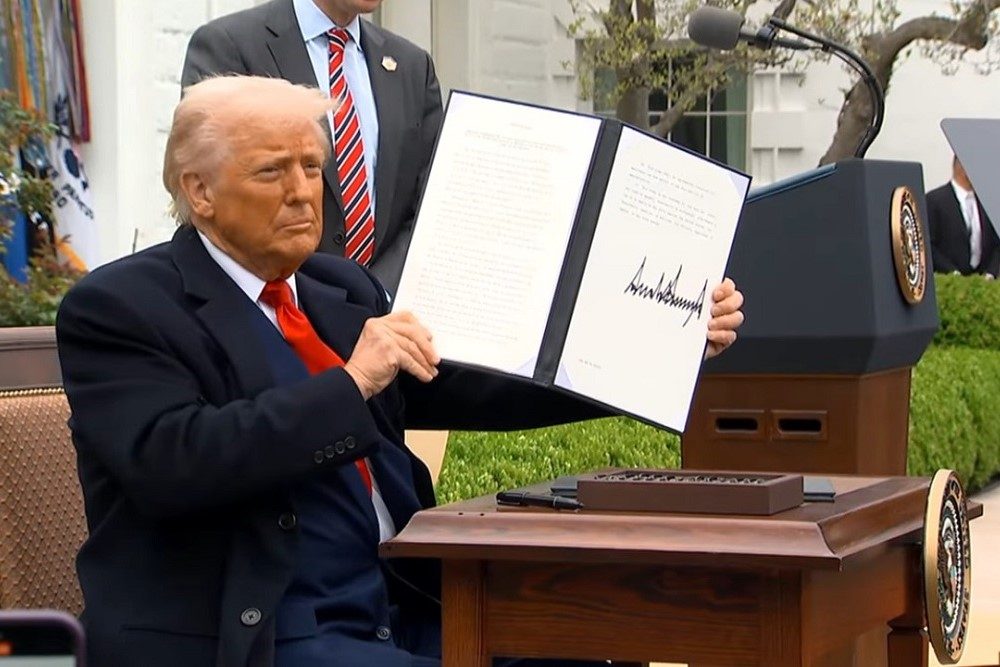Will the US tariff policy be reversed or go a little easier?
If financial markets and politicians can’t be expected to apply pressure to reverse tariff policy, or at least go a little easier, will the US Supreme Court prove the last and only impediment?

The US President Donald Trump announced the US tariffs
Financial markets have not been able to stop the Trump Administration’s march to higher tariffs this year and opposition politicians in the US show no sign that tariffs will be reversed. That seemingly only leaves the judiciary but, even here, the Administration will probably get its way.
This week could see more ‘good’ news on trade should Presidents Trump and Xi sign some trade deals at this Thursday’s meeting. Financial markets have clearly been behaving as if we are in that part of the tariff ‘cycle’ where threats from the US are toned down as deals are agreed. Indeed, judging from the equity market it seems that this ‘upcycle’ in the tariff curve has been worth much more than the downcycle at the start of the year when Trump threatened, and then delivered, punitive tariffs in April.
And while it did seem as if the bond market was going to rein in the Administration’s tariff fervour, when Trump put a 90-day hold on tariffs earlier in the year, the bond market has turned out to be a paper tiger, as indeed has the FX market. This probably has something to do not just with the agreement of subsequent trade deals that have lowered tariffs, but also the fact that the economic effects of tariffs, at least on inflation, have not materialised in the way many might have feared, although it is still early days yet.
However, whatever happens from here, it seems fair to say that financial markets have not proved a lasting constraint on the Administration’s tariff aspirations. Nor too have opposition politicians in the US. The government might be closed right now but it is not closed because of any major disagreement over tariffs. Instead, the Democrats want the reversal of expiring tax credits that reduce health costs and a reversal of Trump’s cuts to Medicaid.
Steven Barrow, Head of Standard Bank G10 Strategy said, there’s little doubt that if the Democrats take control of Congress in next years’ mid-terms and/or the presidency two years later, there will be no reversal of the tariff policy. That’s not just because tariffs could be producing significant revenues by then, with Treasury Secretary Bessent putting a figure of USD500bn per year on tariff revenue. It is also because, deep down, Democrats are pretty protectionist as well, even if they don’t go to the lengths of this Administration. For instance, the number of adverse trade actions taken against other countries was higher under Biden’s presidency than under Trump’s first term.
If financial markets and politicians can’t be expected to apply pressure to reverse tariff policy, or at least go a little easier, will the US Supreme Court prove the last and only impediment? In Steven Barrow’s view, the Supreme Court is due to hear verbal arguments on November 5th and the outcome of their deliberations seems likely to come before the end of the year. Remember that the arguments here apply only to the country-specific tariffs, not the product-specific tariffs. Nonetheless, if upheld as illegal, it would cause the Administration acute difficulty as it would have to scramble to use other legislation than the International Economic Emergency Policy Act (IEEPA) to push tariffs through.
But how likely is it that the Supreme Court will declare the tariffs illegal? Steven Barrow’s view has always been that the tariffs should be deemed illegal as the national emergency excuse by the Administration is feeble and allowing the tariffs will set a dangerous precedent, giving the Administration carte blanche to cite all sorts of ‘emergencies’ for future policies that skip Congressional scrutiny.
“We think it marginally more likely than not that the Supreme Court will rule the tariffs illegal but it is clearly a tough call and not one that investors should try to pre-judge. And besides, as we’ve said, the Administration should be able to circumvent the decision by using different legislation to apply the tariffs if necessary. Add this to the fact that the decision could come very late in the year, when financial markets are already winding down for the holiday period, and it looks as if any curtailing of the Administration’s tariff policy won’t be compounded by a new round of financial market pressure to ditch the tariffs”, said Steven Barrow.








